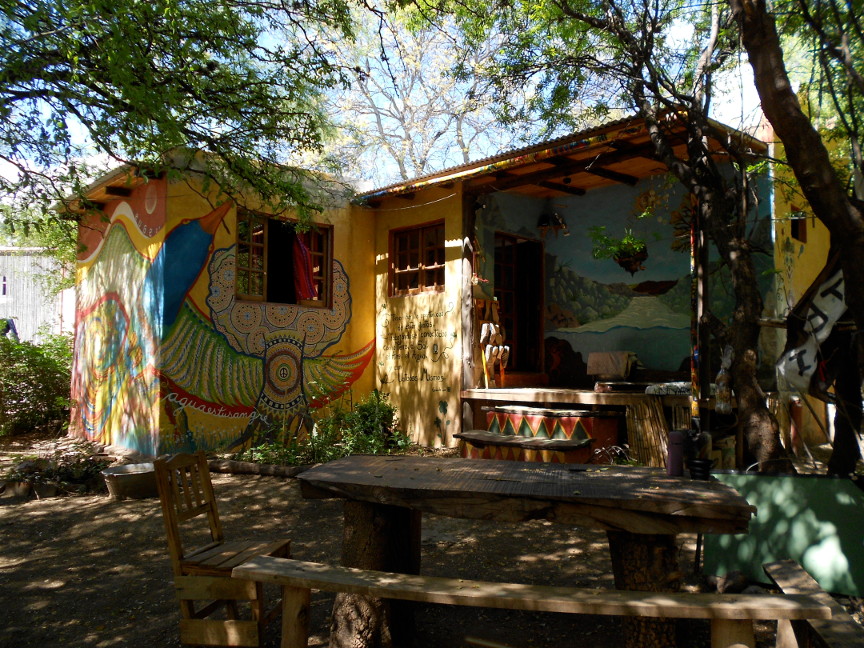
"Peace comes from the inside, do not look for it outside." - Buddha

This article is going to be very brief, compared to the others.
I recently spent a weekend with my girlfriend, in a wonderful place in the Sierras de Córdoba, Argentina. This place was very quiet, a rustic town with around 1000 inhabitants. People lived there quietly and in contact with nature. The pace of life was slower and more natural. The cycles of day and night, the diurnal heat and the nocturnal cold, as well as the little illumination of the place at night, made it easy for us to follow the circadian cycles. Namely, going to sleep early, bacause it got too dark; and waking up early in the morning, with the first rays of sun.
The body gets used to this naturally. Rest is more restorative, the mind clears and the vision of nature in all its splendor (plants, animals, streams) predisposes one to optimism and peace of mind. At the same time, the places where we come in contact with people of very different professions and ideas make us leave the comfort zone, the daily routine, the monotony, the predictable things.
These days that I spent disconnected and in a quieter environment, were good from the creative point of view. That leads me to reflect, how much of our creative energy, and how much of our mental attention is wasted with the stimuli and interruptions that we permanently receive in the big cities. There is also the issue of noise: large cities are noisier because of traffic and because people live at a faster pace, speak faster, behave more aggressively, etc.
All this goes against creativity. In order to have new ideas or to be able to produce something new from the intellectual point of view (for example: write an article or a book, code a computer program, or create a new theory) it is necessary, every now and then, to disconnect from the rest of the world.
During that trip that I described earlier, that disconnection was facilitated, precisely, by the bad Internet signal at that place, and because it was so much more interesting to look at nature around us and relax. Unfortunately we cannot live traveling or retreating to places like this all the time, but those of us who live in large cities can still use other resources to improve our creative moments.
My advice for those who are trying to be more productive writing, programming or doing any other activity that requires concentration and imagination is simple: turn off the cell phone or put it in airplane mode while you are doing that activity. You should also close Facebook and any other social media site while doing your creative work. And avoid checking the e-mail, as well. The constant notifications, if we leave the cell phone on, it will make it more difficult for us to concentrate and find the peace of mind necessary to generate new things.
We can do this, for example, at 3-hour intervals, to increase our productivity. Perform our intellectual work during those three hours, without any external stimulus that would otherwise interrupt us. And then, reconnect with the world for half an hour, take a break, check our messages (see if anything happened that really requires our attention). And then, disconnect again for another three hours to continue with our task. Indeed, as Facundo Manes and other neuroscientists have pointed out, in order to be creative you have to be relaxed. The eureka moments do not happen while we are stressed and doing multitasking. For us to be able to elaborate complex thoughts as those that lead us to create something new, it is necessary to avoid the permanent interruption of the external stimuli:
"Attention is a key cognitive process that we need for carrying out our daily actions, and also for exercising our higher mental functions, such as memory ... Attention is a resource with limited capabilities. When we are facing two complex sources of information, the efficiency of one decays against the other. In a context like the current one, where we live in a constant bombardment of stimuli (electronic messages, chats, instant news, phone calls, social networks), the concern for attention has become exacerbated." (Facundo Manes)
For every distraction, for every interruption, our mind can take up to 15 minutes to refocus. It is easy to see how six or seven interruptions while we are in the middle of our creative process, could then literally ruin our day (in terms of intellectual productivity).
(C) August 2, 2018, Alejandro Moliné.
Your comments or feedback are welcome: contacto@alemoline.com